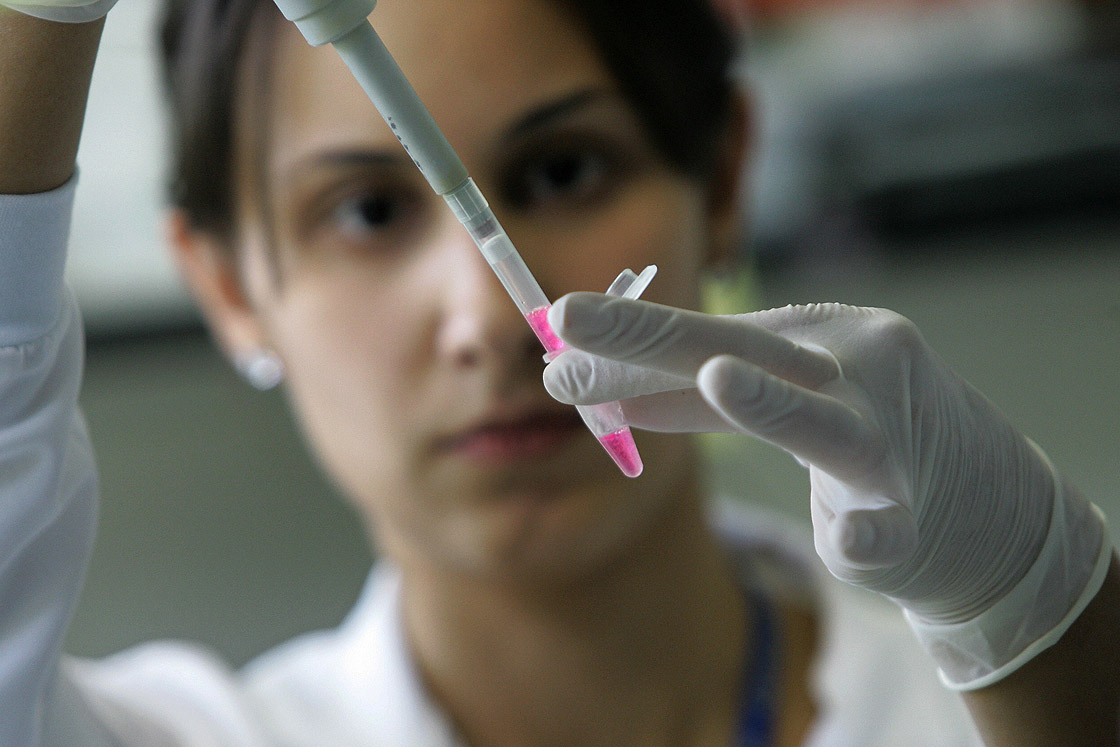The United States Supreme Court heard arguments Monday on whether it should be possible to patent human genes. It’s a ruling that could have an enormous impact on medical research and business around the world, as many companies already own some very lucrative patents.

In this case Myriad Genetics owns the commercial rights to two genes that are linked to an increased risk of breast and ovarian cancers, worth about $500 million USD, because Myriad sells the only test for the gene.
Separate the gene from its use, experts say
Richard Gold, founding director of the Centre for Intellectual Property Policy at McGill University, believes there is a distinction to be made between a gene itself and its uses. He and his colleagues submitted a brief to the Supreme Court.
“Our basic argument was that genes should be patentable where you’ve identified a function that is different then what it does in nature,” Gold said. “But if all you’re doing is cutting out the DNA from the human body, but not changing what it does, in fact relying on what it does, it should not be patentable.”
Dr. Mark Poznansky, president and CEO of the Ontario Genomics Institute, agrees.
“I think patenting genes per se is probably not a good idea,” Poznansky said. “But patenting the use of genes, as in developing new technologies for detecting disease and developing new drugs, is probably something that is a necessity.”
Balancing medical research with commercial interests
According to Euan Taylor, chair of the Intellectual Property Institute of Canada’s Biotechnology Patents Committee, the ability to patent the uses of genetic material in a unique way is so important because it allows for research to take place.
“Biotech research is extremely expensive and people put up a lot of money up front in the hopes that they’ll be able to recoup it in the long term,” Taylor said. “If there was no patent protection then a lot of these inventions that have come from biotechnology just wouldn’t exist.”
On the other hand, Gold warns that there needs to be some restrictions to the patenting of genetic material, especially in a country like Canada with public healthcare. He thinks one of the benefits of a public system is that it can be centralized and efficient, something that can be hampered by too many patents.
“In the future you’re going to want to do genetic tests across a variety of genes, not just one gene at a time, but 20, 30 or perhaps the entire genome of a person,” Gold said. “If different people own different pieces of the genome and can prevent you from doing that, then it becomes very difficult.”
Most countries, including Canada, do have an exemption policy in the patent law to allow for purely academic research to take place. That’s what Poznansky is doing. He holds five or six patents himself.
“I have a piece of intellectual property that I’ve patented and I say that this can be readily available to the academic community for research,” Poznansky said. “But I reserve the right for the commercial use.”
The problem is research and commercial benefit often goes hand-in-hand.
“The line between what’s research and what is a competitive service is blurred and so too many patents, especially of uncertain scope, make people in public laboratories afraid of being sued,” Gold said. “What they’ll do is move away from those research areas.”
Not all patent law is uncertain however, Taylor says patents are often quite specific.
“Patents can be relatively narrow. So it’s not saying that nobody can treat anybody by using anything like this,” Taylor said. “It doesn’t stop anybody developing new methods to do it.”
How the U.S. court case could affect Canada
Narrow or broad, if the United States Supreme Court decides to rule in favour of tighter restrictions on patenting genetic material, Canada could feel the consequences.
“We may be in a very strange situation where the United States offers less patent protection, makes it harder to get patents, than in Canada,” Gold said “We would be offering U.S. patent holders greater protection here, making our healthcare system pay even more.”
Gold thinks this case could open the floodgates.
“We’re kind of in the worst of all worlds,” Gold said. “It’s not just the Myriad patents, but it’s a whole bunch of other companies that are coming in as well. They all have similarly constructed patent claims and it’s those that will cause worry.”
With files from The Canadian Press

Comments